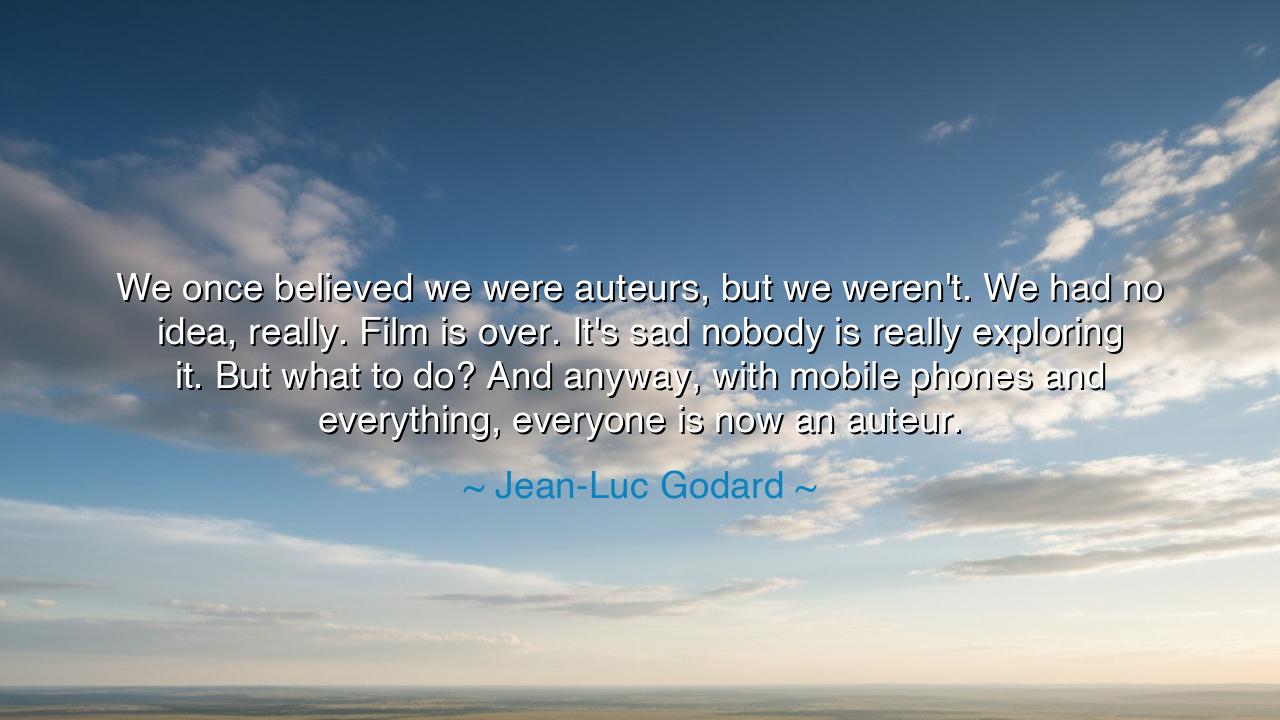
We once believed we were auteurs, but we weren't. We had no idea
We once believed we were auteurs, but we weren't. We had no idea, really. Film is over. It's sad nobody is really exploring it. But what to do? And anyway, with mobile phones and everything, everyone is now an auteur.






Hear, O lovers of art and seekers of vision, the voice of Jean-Luc Godard, prophet of cinema, who broke the chains of convention and remade the language of film. He spoke in his twilight with both sorrow and irony: “We once believed we were auteurs, but we weren't. We had no idea, really. Film is over. It's sad nobody is really exploring it. But what to do? And anyway, with mobile phones and everything, everyone is now an auteur.” In these words lies both lamentation and revelation, the mourning of a dying art and the recognition of a world transformed.
The meaning of his words flows on two rivers: one of despair, the other of liberation. Once, in the fervor of the French New Wave, Godard and his companions declared themselves auteurs—authors of cinema, masters of vision, rebels against the factory-like systems of Hollywood. They believed they were inventing, discovering, shaping film as a new art of truth. Yet, looking back, Godard admits humility: they were not the gods of cinema they imagined. Their exploration, though fiery, did not exhaust the possibilities of the medium. Indeed, the tragedy he names is that few now push further—few explore, few dare. The art form he loved, he declares, has withered into repetition.
But then comes the paradox: in the world of mobile phones, everyone is now an auteur. What once demanded cameras, crews, studios, and budgets is now in the palm of every hand. The power once reserved for a few visionary directors belongs now to the multitudes. Every passerby can record, create, narrate their own truth. Yet Godard does not speak this with triumph alone—he also sighs, for ubiquity dilutes reverence. When all are auteurs, the sacred weight of authorship is diminished, and the art once fought for seems scattered like dust in the wind.
History shows us this cycle of creation and decay. Consider the scribes of ancient times, when only a few could read and write. To be an author was to carry sacred authority. Yet with the invention of the printing press, knowledge spread to all, and suddenly every voice could find the page. It was both a death and a rebirth: the loss of the sacred few, the rise of the multitude. What Godard laments in film is what scribes once lamented in words—the passing of an age where mastery was rare into one where creation is everywhere.
And yet, as in all things, the death of one form gives rise to another. Film is not over, though Godard declared it so; rather, it has changed its body. It has left the grand temples of cinema and now walks in the streets, in the devices of children, in the voices of those once silent. Whether this is degradation or evolution depends not on the medium, but on the soul of the one who creates. For the true auteur is not crowned by industry, but by vision. A million films may be made, but only those birthed from courage and honesty will endure.
The lesson for us is to embrace both humility and responsibility. We are all, in some sense, auteurs now—able to shape narratives, to tell stories, to frame the world through our eyes. But we must not mistake access for mastery. The challenge is not merely to create, but to create with depth, with thought, with daring. Godard’s lament is a warning: do not let abundance drown exploration. Seek the unexplored, break the forms, and pursue art not as vanity but as truth.
As for practical action, take up the tools you have—your camera, your words, your voice—and use them with intention. Do not fear failure, for even Godard admitted he “had no idea, really.” What matters is the attempt, the courage to explore where others will not. Study the old masters, yes, but do not worship them; build upon their ruins. And above all, remember: the world does not need more noise. It needs vision. Be not only an auteur by device, but by heart.
Thus, Jean-Luc Godard’s words echo as both dirge and summons: “Film is over… and anyway, with mobile phones and everything, everyone is now an auteur.” Mourn the passing of what was, but rise to the challenge of what is. For art is never truly dead—it is only waiting for the brave to bring it alive again. And if you would honor Godard and his generation, do not argue about the state of cinema. Pick up your lens, and explore.






AAdministratorAdministrator
Welcome, honored guests. Please leave a comment, we will respond soon